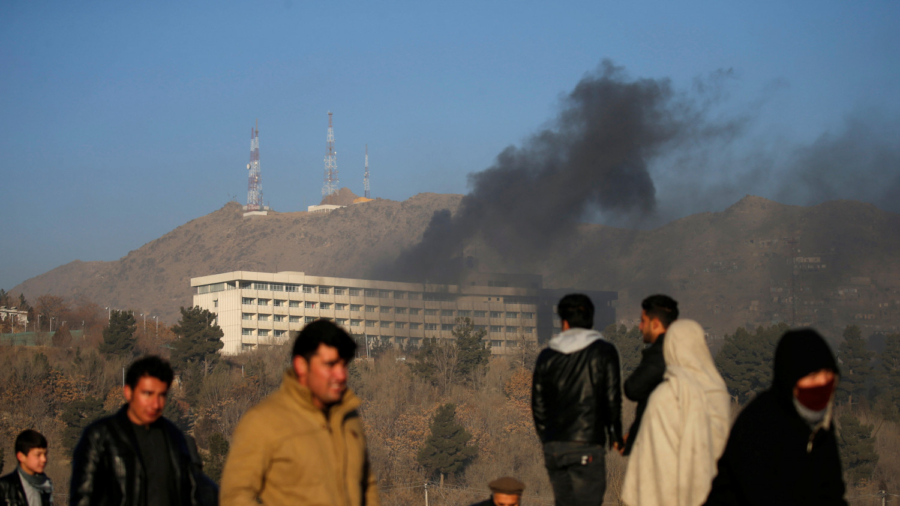KABUL—Gunmen dressed in army uniforms who stormed Kabul’s Intercontinental Hotel battled Afghan Special Forces for 13 hours in an overnight siege that caused heavy casualties among hotel guests, officials and witnesses said on Sunday.
The Taliban claimed responsibility for the attack, which saw more than 150 guests flee as parts of the building caught fire, with some shimmying down tied-together sheets from upper-floor windows and others rescued by Afghan forces.
Interior Ministry spokesman Najib Danesh said at least five people—four Afghans and one foreigner—were killed and six wounded but the casualty total is almost certainly higher.

Local airline Kam Air said around 40 of its pilots and air crew, many of whom are foreigners, were staying in the hotel and as many as 10 had been killed. But Zamari Kamgar, the airline’s deputy director said it was still trying to locate its staff and did not yet know whether they were all safe.
Abdul Rahman Naseri, a guest who was at the hotel for a conference, was in the hall of the hotel when he saw four insurgents dressed in army uniforms.
“They were shouting in Pashto (language), ‘Don’t leave any of them alive, good or bad. Shoot and kill them all,’ one of them shouted,” Naseri said.
“I ran to my room on the second floor. I opened the window and tried to get out using a tree but the branch broke and I fell to the ground. I hurt my back and broke a leg.”
It is unclear exactly how many gunmen were involved and even after officials said the attack was over, sporadic gunshots and explosions could be heard from the site. Danish said three gunmen were killed, while witnesses said four were involved and the Taliban said five.
The raid was the latest in a long series of attacks which have underlined the city’s precarious situation and the ability of militants to mount high profile operations aimed at undermining confidence in the Western-backed government.
Taliban spokesman Zabihullah Mujahid sent a statement claiming responsibility for the attack, which he said had been carried out by five fighters.
A statement from the interior ministry put the blame on the Haqqani network, a group affiliated with the Taliban, which claimed a previous attack on the hotel in 2011.
Thick Smoke
As day broke on Sunday, thick clouds of black smoke could be seen pouring from the building, an imposing 1960s structure set on a hilltop and heavily protected like most public buildings in Kabul.
The Intercontinental is one of two main luxury hotels in the city and had been due to host an information technology conference on Sunday. More than 100 IT managers and engineers were on site when the attack took place, Ahmad Waheed, an official at the telecommunications ministry, said.

As Special Forces maneuvered around the site, several armored U.S. military vehicles with heavy machine guns could be seen close to the hotel along with Afghan police units.
Hotel manager Ahmad Haris Nayab, who escaped unhurt, said the attackers had got into the main part of the hotel through a kitchen before going through the hotel, with many guests trapped in their rooms.
“When the sixth floor caught fire this morning, my roommate told me, either burn or escape,” said Mohammad Musa, who was hiding in his room on the top floor when he heard gunfire.
“I got a bed sheet and tied it to the balcony. I tried to come down but I was heavy and my arms were not strong enough. I fell down and injured my shoulder and leg.”
The raid came just days after a U.S. embassy warning of possible attacks on hotels in Kabul.
U.S. Warning
Although U.S. and Afghan officials say the Taliban has come under strain after the United States increased assistance to Afghan security forces and stepped up air strikes against insurgents, security remains precarious.
As pressure on the battlefield has increased, security officials have warned that the danger of attacks on high-profile targets in Kabul and other cities would increase.

After repeated attacks in Kabul, notably an incident last May in which a truck bomber killed at least 150 people outside the German embassy, security has been further tightened.
But the attack, just days after a U.N. Security Council visit to Kabul to allow senior representatives of member states to assess the situation in Afghanistan, may lead to a further tightening of security in Kabul.
President Ashraf Ghani ordered an investigation and said militant groups were being helped by neighboring countries.
“As long as the terrorist groups have secure protection and safe haven, the region will not find security, stability,” he said in a statement.
Large areas of the city center are already closed off behind high concrete blast walls and police checkpoints but the ability of the attackers to get into a well-protected hotel frequented by both government officials and foreigners demonstrated how difficult it remains to prevent high profile attacks.
Danish said a private company had taken over security of the hotel about three weeks ago.
U.S. ambassador John Bass condemned the attack and said the embassy was in close contact with Afghan authorities. “Such violence has no place here or anywhere in the world,” he said in a statement.
Captain Tom Gresback, spokesman for the NATO-led Resolute Support mission in Afghanistan, said they were also watching closely but it was not clear what role international forces took in suppressing the attack.
By Akram Walizada and Mirwais Harooni. Additional reporting by Hamid Shalizi, Jibran Ahmad and David Brunnstrom


